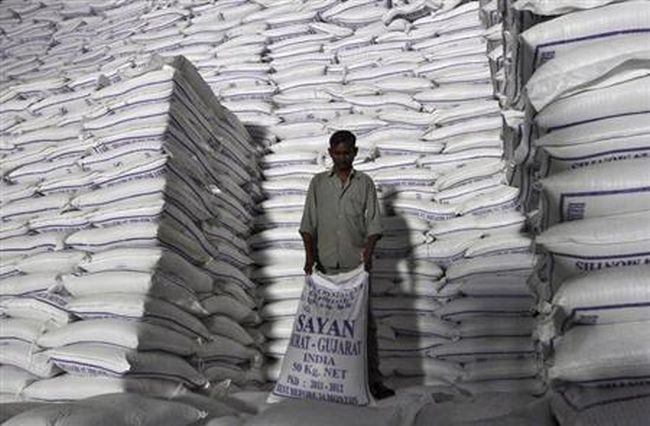A projected drop in production in the 2016-17 sugar season (October-September) has kept domestic prices firm, reflecting in improved profitability and stock prices of companies, say Ajay Modi and Sanjeeb Mukherjee.

At a time when most consumption-driven sectors dread the impact of demonetisation, the mega event has come as a saviour for the sugar industry.
With production set to be less than consumption, unlike recent surplus years, a demonetisation-led consumption decline comes as a strong argument against the need and lobbying by some to encourage imports by lowering the duty (now at a high 40 per cent).
A projected drop in production in the 2016-17 sugar season (October-September) has kept domestic prices firm, reflecting in improved profitability and stock prices of companies.
However, there is no single estimate for production. That of 23.4 million tonnes by the Indian Sugar Mills Association is higher than the central government's estimate of 22.5 mt. ISMA is expected to announce another estimate later this month.
Last year's output was 25.2 mt.
Lower than expected production would mean firmer prices in the near future. Especially as bulk buying by institutional consumers such as beverage makers would pick up in the next couple of months. Bulk buyers, who include confectioneries and the pharmaceutical industry, consume a little over 60 per cent of India's production.
There is a view in quarters outside the industry that there is a need to import sugar and the government will have to lower the duty to make these feasible.
"There are vested interests trying to establish that the estimates of government and ISMA are incorrect. We have a situation where domestic consumption is declining and a bumper crop is expected next year. Imports would be a death knell for the industry and farmers," said Tarun Sawhney, vice-chairman at Triveni Engineering and Industries, which owns seven sugar mills in Uttar Pradesh.
ISMA had earlier pegged domestic consumption at 25.5 mt in this sugar year. It now expects this to be 24.5-25 mt, against 24.8 mt in the earlier year. The carry-over stock from the earlier year is 7.7 mt.
Vote politics also at work
Experts who track the sector say the government is not keen to take a decision on lowering the import duty at this point. The largest cane and sugar producing state is UP and it goes to the polls next month. In recent weeks, there has been discussion within the government on availability and prices but no move to bring down the duty has been initiated.
"A move to lower the import duty could be seen as anti-farmer, as it will impact sugar mills’ realisation and capacity to make timely cane payments," said an analyst.
Mills in the region have struggled to make payments in recent years.
The Bharatiya Janata Party, which runs the central government, is aiming at gains in the UP assembly elections. The Samajwadi Party government has done its bit to woo farmers with a nine per cent increase in the cane price.
This is a major cash crop in UP and accounts for roughly Rs 30,000 crore of the direct economy. About four million rural households in the state are engaged in cane farming.











